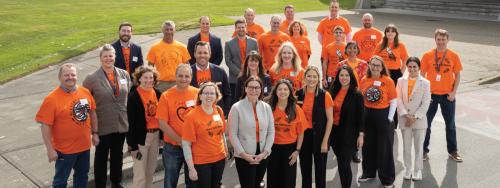Delta’s Tilbury ice arena is just down the road from our Tilbury LNG facility and we wanted them to be one of the first rinks to benefit from an innovative project we began a few years ago.
Arenas typically use natural gas-heated water to keep their ice smooth for skaters, which can compromise the clarity and hardness of the surface layer. Electricity is then required to freeze the heated water once it’s set down on the surface. This process requires a lot of energy, and means big natural gas and electricity bills.
A FortisBC-funded pilot project introduced water spinning technology to ten rinks across the province, allowing them to use unheated water, which eliminates micro-bubbles on the ice surface. This saves energy and money, while maintaining—or improving—the quality of the ice.
“Manufacturers of the water-spinning equipment had been trying for five years to get rinks to use this new technology, but no one wanted to be a guinea pig,” says Jim Kobialko, a FortisBC innovative technology program manager.
Prior to the pilot, rink operators didn’t have confidence in changing the 100 year old ice making process. Now that the FortisBC pilot results are in, showing not only proven gigajoule savings but also favourable ice conditions, ice operators are starting to adopt the technology across BC and Canada.
Rinks using the new technology have seen stronger, clearer ice and significant savings. A total of 10 arenas across BC participated in the pilot program. Together they reduced their energy consumption by 2,900 gigajoules per year, which is like taking 714 cars of the road annually.



